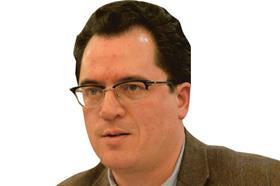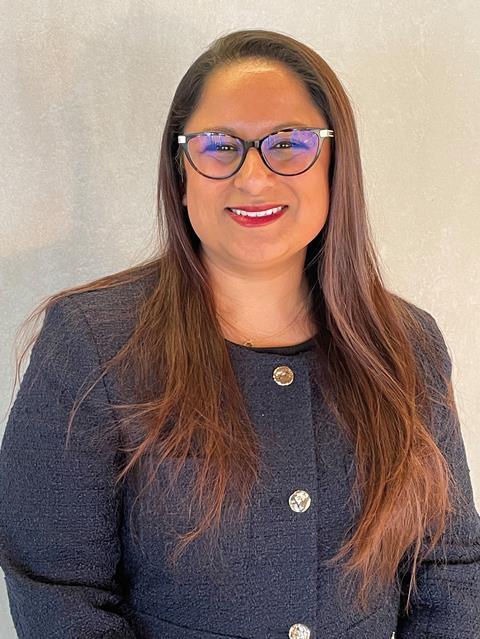Reena Parmar did not know her eldest son was neurodivergent until he started school. ‘We hadn’t realised,’ she says. But then ‘things became very challenging very quickly. And it was very hard’.

She had qualified into the debt capital markets practice at Clifford Chance, progressing over 13 years from trainee to senior associate. Now she found herself juggling transactional work and client demands alongside medical appointments and the daily challenges of family life with a demanding disability.
‘Being present for my son, supporting him through a difficult period,’ Parmar says, was ‘a catalyst for me to move… my kids really needed me present and I just wasn’t’. She joined Freshfields as a knowledge lawyer, a role that allowed for a more manageable work/life balance.
Her younger son is also neurodivergent. Since arriving at Freshfields, she has been open about her own disabilities: axial spondyloarthritis, ‘a form of rheumatoid arthritis that affects the spine’, fibromyalgia, which causes pain and extreme sensitivity across the body, and endometriosis.
At the start of her career, Parmar saw her disabilities ‘as something that would hold me back. I was very careful about what I said and who I said it to about my disability’. It is significant, she says, that her promotion to ‘counsel’ last year came when she was open at work about her disabilities: ‘For me, that was a real achievement because by that point I was quite open about my disability.’
It was notable, she reflects, ‘because there are so few openly disabled role models in positions of seniority, particularly those that talk about intersecting identities’.

Keeping work and family life going while managing personal and child disabilities is exhausting. But Parmar has also used her experience, voice and platform to build networks and advocate for changes to benefit disabled lawyers and staff. That included setting up Freshfields Enabled, a formal network within her firm, and joining the committee of the Law Society’s Disabled Solicitors Network, which she now chairs.
This week her efforts were recognised through her inclusion in the Shaw Trust’s ‘Disability Power 100’, ranking third in her category.
The list’s head, Alona De Havilland, says: ‘The Disability Power 100 is all about creating change. It celebrates ambition and achievement, and plays a role in challenging perceptions of disability by recognising the strengths, contributions and successes of 100 disabled individuals each year.’
The list is divided by sector. Parmar is in the ‘law, media and politics’ section. ‘I’m still pinching myself,’ she says. ‘It’s easy to think quite negatively about yourself and what you’re capable of and what you can achieve.’
Recognition matters, she explains. The list is ‘a catalyst for positive impact in the UK… it counters that internal narrative… I think there’s an awful lot of disabled people that have internal ableism that shouts at them’.
Parmar founded Freshfields Enabled in December 2019 with colleagues who ‘identified as disabled and neurodivergent’. Its purpose is twofold. First, like all workplace networks, there is the support that members can provide to one another. Second, it is a point of contact and expertise for the firm. The ongoing contact between network and firm is a dialogue that should elevate good intentions to actions that support a more focused approach. ‘We have to be very strategic and targeted in what we tackle,’ she says.
Parmar stood down as head of Freshfields Enabled to concentrate on chairing the Disabled Solicitors Network. The network (formerly the Lawyers with Disabilities Division) gained in prominence with the publication of the 2020 report Legally Disabled? about the experiences of disabled people working in the legal profession.
The report’s findings remain relevant. ‘Legally Disabled? has really shaped the work of the committee and the network,’ Parmar says. It highlighted the reluctance of people to disclose a disability, identified places from which the profession should learn to build an inclusive environment, and related aspects of the workplace and work practices that currently disadvantage disabled lawyers.
Subsequently, the network has published reports and guides with a practical focus including ‘Easy wins and action points for disability inclusion’ and ‘Reasonable adjustments guidance’. Regular events aim to build the strength of the network for its members, and in 2022 there was a roundtable discussion in partnership with the Gazette: ‘No more holding back’. It posed the question: ‘From recruitment to career progression, can the legal profession turn around its poor performance on the experience of disabled solicitors?’
The network has prepared a guide to the terminology of disability, published this week. ‘We wanted to do something to help open up the conversation around disability and neurodiversity in the workplace,’ Parmar explains. ‘We recognise that people can be scared to broach the topic because they’re worried about getting the language wrong.’
Currently, she is keen to push Project Rise, the network’s cross-enterprise initiative to promote part-time training contracts: ‘I want to see flexible training contracts become more mainstream. I want recruitment practices to become more accessible. I would really like there to be a shift away from psychometric testing… which is often used as a filtering tool. But [one] that disadvantages disabled and neurodivergent candidates.’
Parmar would like to see a profession that includes more people who feel the way she now does about her disabilities. ‘My journey has evolved,’ she says. ‘Being disabled is something that I feel quite proud of.’
Find more information on the Disabled Solicitors Network here



























No comments yet